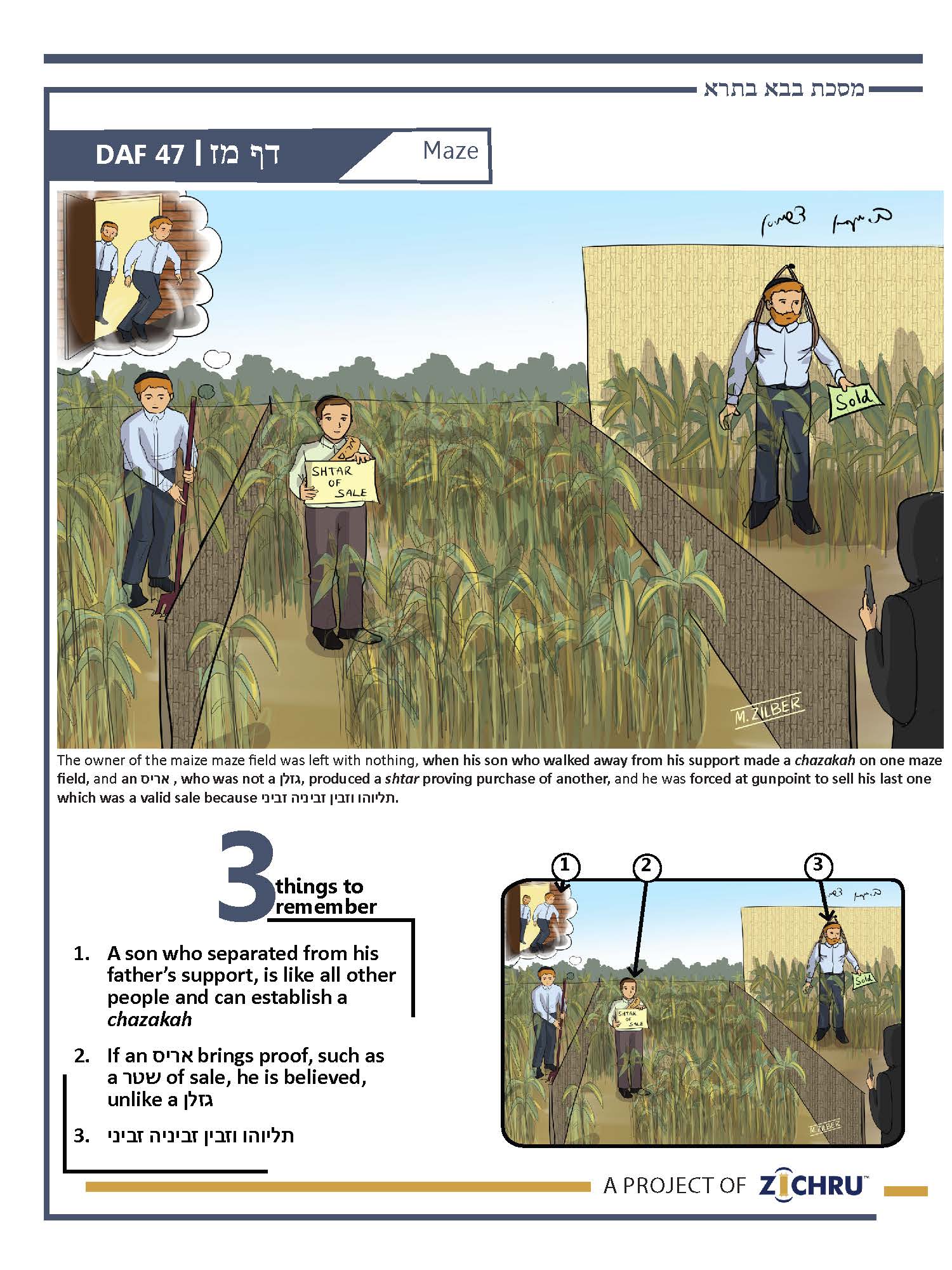Bava Basra - Daf 47
- Audio Timestamps
0:00 - The 3 Sugyos
2:52 - Review of 3 Sugyos
5:35 - Siman
8:16 - 4 Blatt Back Chazarah
16:38 - Pop Quiz (Last 7 blatt)
For access to all Zichru resources including PDFs, and illustrations CLICK HERE
- An אומן, etc. can establish a chazakah after leaving his role
A Baraisa teaches that although an אומן cannot establish a chazakah, ירד מאומנותו יש לו חזקה – if he left his profession, he can establish a chazakah. Similarly, an אריס who left his profession can establish a chazakah. בן שחלק – Regarding a son who separated from his father’s support, ואשה שנתגרשה – and a woman who was divorced, הרי הן כשאר כל אדם – they are like all other people and can establish a chazakah, since they no longer receive support from the father and husband (respectively). The case of a son is a novelty, for one might have thought אחולי אחיל גביה – [the father] waives his rights regarding [his son] and does not protest his occupation. But the case of the divorcee is obvious, since he hates her and would not allow her to consume his produce!? The Gemara answers that the case is: במגורשת ואינה מגורשת – where she is “divorced and not divorced,” i.e., a safek if her divorce was effective, because Rebbe Zeira taught that the husband must support her. Still, he would only give her produce when compelled and would not allow her to occupy his property.
- Proof brought by an אומן, etc., vs. a גזלן
Rav Nachman said that Rav Huna told him: כולן שהביאו ראיה – all of them (an אומן, etc.) if they bring proof (such as witnesses that the owner admitted selling it, or a שטר of sale), ראייתן ראיה – their proof is accepted as proof, ומעמידין שדה בידן – and we place the field in their possession. גזלן שהביא ראיה – However, if a robber brings proof, אין ראייתו ראיה – his proof is not accepted as proof. The Rashbam references Rav Kahanah’s explanation on this Daf, that the victim felt compelled to falsely confess or write a שטר of sale, knowing that if he would not, הוה ממטי ליה לדידיה ולחמריה לשחוור – [the robber] would have handed him and his donkey to the captain (for confiscation). The Gemara asks that a Mishnah already taught that if one buys property from a סיקריקון – extortionist (who threatens to kill those who will not sell him their property), even if the first owner also sells it to him, the sale is invalid, since the owner may have acted out of fear. The Gemara answers that Rav Huna taught that even if he wrote a שטר of sale (which Rav holds is valid), the buyer still does not own the property, like Shmuel holds.
- תליוהו וזבין זביניה זביני
Rav Bivi quoted Rav Nachman saying that although a sale to a robber is invalid, the robber’s money is refunded. The Rashbam infers that Rav Nachman invalidates a sale even where money was paid.
Rav Huna disagrees and says: תליוהו וזבין – If they hung him or otherwise afflicted him and he sold to them what they demanded, זביניה זביני – his sale is a valid sale. This is initially explained: כל דמזבין איניש – anything a person sells, אי לאו דאניס לא הוה מזבין – if he were not pressed for money he would not have sold it; ואפילו הכי זביניה זביני – yet his sale is a valid sale. Here, too, a sale made under physical duress should be valid. This comparison is rejected: ודילמא שאני אונסא דנפשיה מאונסא דאחריני – perhaps internal duress is different from external duress, and though one sincerely agrees to sell personal items when pressed for money, he does not do so when others force him to sell. The Gemara ultimately explains on the next Daf: סברא הוא – it is logic, אגב אונסיה גמר ומקנה – because of his duress, he agrees to transfer it sincerely (when he receives payment and loses nothing).
Siman – Maze
The owner of the maize (corn) maze field was left with nothing, when his son who walked away from his support made a chazakah on one maze field, and anאריס , who was not a גזלן, produced a shtar proving purchase of another, and he was hung up and forced at gunpoint to sell his last one which was a valid sale because תליוהו וזבין זביניה זביני.


